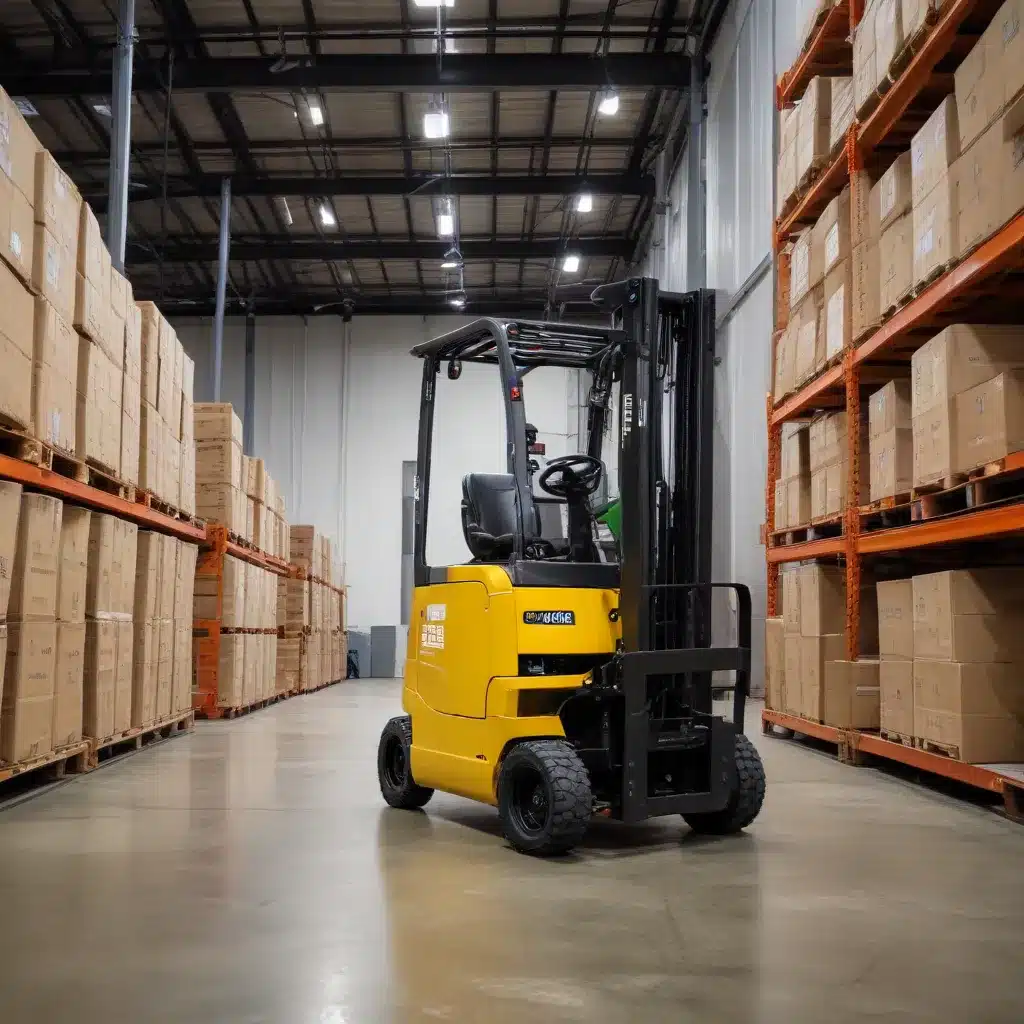
The Evolving Landscape of Forklift Technology
As the logistics and warehousing industry faces mounting pressure to reduce its environmental impact, a growing number of organizations are turning to electric forklifts as a sustainable solution. These advanced machines are poised to revolutionize material handling, offering a range of benefits that extend far beyond simply powering operations.
In this comprehensive guide, we’ll delve into the world of electric forklifts, exploring their role in driving sustainability throughout the supply chain. From reviewing the latest technological advancements to analyzing the practical implications for warehouse managers, we’ll provide you with the insights and practical tips needed to navigate this transformative shift in the industry.
Embracing Sustainability with Electric Forklifts
The rise of electric forklifts comes at a critical juncture, as logistics businesses grapple with the need to reduce their carbon footprint and meet increasingly stringent environmental regulations. Unlike their traditional counterparts that rely on fossil fuels, electric forklifts offer a clean and efficient alternative, aligning seamlessly with the industry’s sustainability objectives.
Reduced Emissions and Energy Consumption: One of the primary advantages of electric forklifts is their ability to significantly reduce greenhouse gas emissions and energy consumption. By eliminating the need for internal combustion engines, these machines eliminate the direct release of harmful pollutants, contributing to cleaner air quality within warehouse facilities. Moreover, the efficiency of electric motors translates to lower energy usage, allowing organizations to curb their overall energy expenditure and carbon footprint.
Noise Reduction: Another notable benefit of electric forklifts is their significantly quieter operation compared to their diesel or gasoline-powered counterparts. This quieter environment not only enhances the working conditions for employees but also reduces the overall noise pollution in and around the warehouse, making for a more harmonious and productive workspace.
Improved Workplace Safety: The reduced noise levels and elimination of exhaust fumes associated with electric forklifts create a safer working environment for warehouse personnel. This, in turn, can lead to improved employee well-being, reduced absenteeism, and enhanced productivity – all of which contribute to the overall efficiency and profitability of the logistics operation.
Navigating the Transition to Electric Forklifts
While the benefits of electric forklifts are compelling, the transition from traditional models can present its own set of challenges. Warehouse managers must navigate a range of considerations to ensure a seamless and successful integration of these sustainable machines into their operations.
Power Source and Charging Infrastructure
One of the primary considerations in the transition to electric forklifts is the power source and charging infrastructure. Warehouse facilities must invest in the appropriate charging stations and electrical infrastructure to support the fleet of electric vehicles, ensuring reliable and efficient charging.
Lithium-ion and TPPL Battery Technologies: Advanced battery technologies, such as lithium-ion (Li-ion) and Thin Plate Pure Lead (TPPL), have revolutionized the power capabilities of electric forklifts. These battery systems offer extended run times, faster charging, and reduced maintenance requirements compared to traditional lead-acid batteries, making them an attractive option for warehouse operations.
Opportunity Charging and Fleet Management: Alongside the battery technologies, warehouse managers must also consider the charging strategies and fleet management approaches to optimize the performance and efficiency of their electric forklift fleet. Opportunity charging, where forklifts are charged during breaks or downtime, can help maximize uptime and minimize the need for lengthy charging sessions, improving overall productivity.
Workforce Training and Adaptability
The transition to electric forklifts also requires a shift in workforce mindset and skillsets. Warehouse personnel must be trained on the proper operation, maintenance, and safety protocols associated with these new machines, ensuring a seamless integration and minimizing any disruptions to daily operations.
Upskilling and Reskilling Initiatives: Proactive training and development programs can help equip employees with the necessary knowledge and skills to effectively manage and maintain the electric forklift fleet. By investing in upskilling and reskilling initiatives, organizations can empower their workforce to embrace the technological advancements and unlock the full potential of their sustainable material handling solutions.
Leveraging Data and Analytics
The integration of electric forklifts opens up a wealth of data and analytics that can further enhance warehouse efficiency and sustainability. By harnessing the real-time information generated by these machines, logistics managers can make data-driven decisions to optimize fleet utilization, monitor energy consumption, and identify opportunities for continuous improvement.
Predictive Maintenance and Fleet Optimization: Advanced data analytics can help warehouse managers anticipate maintenance needs, schedule preventive servicing, and optimize the deployment of their electric forklift fleet. This proactive approach not only extends the lifespan of the equipment but also minimizes downtime and ensures maximum productivity.
Visibility and Collaboration Across the Supply Chain: The data generated by electric forklifts can also improve visibility and collaboration throughout the supply chain. By integrating this information with other supply chain management tools, organizations can enhance inventory tracking, shipment monitoring, and overall supply chain optimization, further enhancing sustainability and efficiency.
Unleashing the Full Potential of Electric Forklifts
As the logistics industry continues to evolve, the adoption of electric forklifts presents a pivotal opportunity to drive sustainability and operational excellence. By embracing these innovative machines, warehouse managers can unlock a future where environmental responsibility and business success go hand in hand.
Through a combination of technological advancements, workforce upskilling, and data-driven decision-making, the transition to electric forklifts can help organizations achieve their sustainability goals while simultaneously improving productivity, reducing costs, and enhancing the overall resilience of their supply chain.
To learn more about the latest advancements in electric forklift technology and how your organization can benefit from this sustainable solution, explore the Forklift Reviews website. Our team of industry experts is dedicated to providing practical insights and guidance to help logistics businesses navigate this transformative shift towards a more sustainable future.

